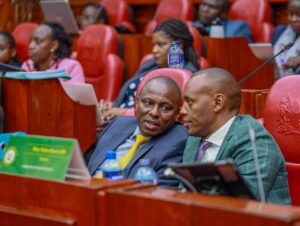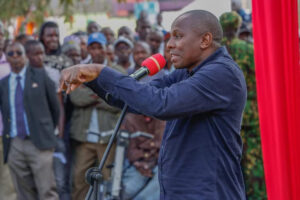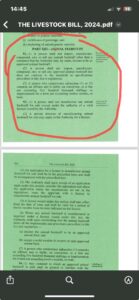Just weeks after the controversial Finance Bill 2024 incited nationwide protests that led to several fatalities, Kikuyu legislator Hon. Kimani Ichung’wah is back in the spotlight with another contentious proposal.

Kimani Ichung’wah consulting with Nixon Korir during a past event
The Livestock Bill 2024, introduced by Ichung’wah, is already causing anxiety among livestock farmers and industry stakeholders.
The bill, set to introduce stringent regulations on the manufacturing and sale of animal feed, has raised concerns due to its potentially punitive measures.

President William Ruto, DP Gachagua and Kikuyu ,MP Kimani Ichungwa
According to the bill, any person who imports, manufactures, compounds, mixes, or sells animal feedstuff that does not meet the standards specified by the new Livestock Inputs and Products Regulatory Authority will face severe penalties. Offenders could be fined up to KSh 500,000 or face imprisonment for up to a year, or both.
The bill’s provisions are intended to ensure that all animal feed sold in the country adheres to approved standards to protect livestock health and productivity. It mandates that all animal feedstuff must be approved by the Authority before it can be sold.
Additionally, it stipulates that manufacturers must obtain a valid license from the Authority, which will be valid for twelve months from the date of issuance.

Kimani Ichungwa gestures during a past event
Critics argue that the bill’s stringent requirements and heavy penalties could cripple small-scale farmers who may not have the resources to comply with the new regulations.
The bill also empowers the Authority to prescribe the types of inputs allowed in livestock production, with violations resulting in fines up to KSh 1 million or imprisonment for up to two years.
The Livestock Inputs and Products Regulatory Authority, as proposed, will be managed by a chairperson appointed by the President, alongside the Principal Secretary in charge of Livestock, the Director of Veterinary Services, the Director of Livestock Production, and a County Executive Committee Member appointed by the Council of Governors.
Opponents of the bill fear that the centralized power within the Authority could lead to bureaucratic inefficiencies and potential misuse of power. The timing of the bill, coming so soon after the Finance Bill 2024, has only heightened public anxiety, with many fearing that the government is out of touch with the challenges faced by ordinary Kenyans.
As the bill moves through the legislative process, stakeholders are calling for more inclusive consultations to ensure that the final legislation supports rather than stifles the livestock sector, which is crucial to Kenya’s economy and food security.




